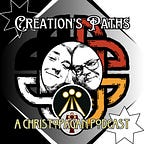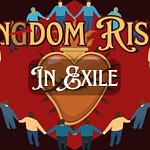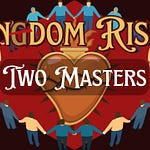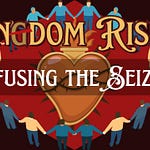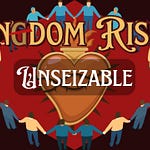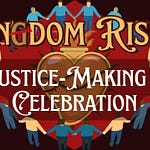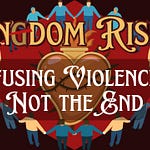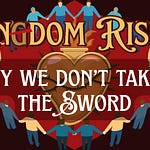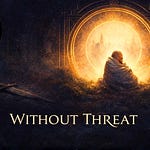Join Charlie and Brian in this enlightening discussion on 'harvesting peace' during the first new moon after Lunasa. We explore the four paths of Creation Spirituality, focusing on the often misunderstood via negativa— the path of sorrow, letting go, and peace. Through a detailed explanation of violence as a removal of agency and an engaging analysis of cultural references like 'John Wick' and 'Derry Girls,' they delve into the essence of peace, incorporating mindfulness and personal anecdotes. This introspective session reflects on the broader implications of peace, justice, and free will, guiding viewers on how to find and cherish moments of tranquility amidst life's chaos. Don't forget to subscribe for more insightful content!
Support us on: https://ko-fi.com/cedorsett
Become a patron of the arts patreon.com/cedorsett
For Educational Resource: Wisdoms Cry https://wisdomscry.com
For all of the things we are doing at The Seraphic Grove go to Creation's Paths https://www.creationspaths.com/
BlueSky https://bsky.app/profile/creationspaths.com
Threads https://www.threads.net/@creationspaths
Instagram https://www.instagram.com/creationspaths/
Transcript:
Blessings and peace be upon you on this first. New moon after. Lunasa. Today, we are going to be talking about what we can glean from this. Day. Really getting into a topic that. I don't hear a lot of people talking about, at least not in the way that we're going to be.
Hello, my name is Charlie and I am a non-binary scifi fantasy writer. I am here joined today by my wonderful husband, Brian. Hello we are going to be talking about harvesting peace today on this first new moon after Lunasa. This is something that I've been wanting to talk about more in our practice.
We have associated the four paths of Creation Spirituality with four of the phases of the moon. Today on the new moon...
Shameless insert for more information on that. Go-to https://wisdomscry.com.
I totally broke your thought.
Yes, he did. So, uh, today on the new moon, we are meditating on the via negativa.
The via negativa is the path of sorrow of pain of letting go and letting be and those are usually as far as we go, when we talk about the via negativa or the negative way. I have always kind of, bristled against this in a way because I think that there is a weird association that we get in our minds with the word negative that we have to look at it in a negative way.
I think that one of the things that we should be working on, , D'var. Dibbur. Is the word of God in the via positive. I am of the opinion that there is actually a word of God in each of the four paths.
This one is up for debate in my head, but the word of God in the via. Negativa is either Shalom or Selah. Shalom means peace and Selah means pause and listen to what you just heard. I think that both of these are appropriate for the day. But I want , especially with everything going on right now in the world to focus on the idea of peace. That today on this new moon, we need to sit, and work on, the harvest of peace and harvesting peace.
Peace is something that I think we all want. I think it's something we all think about and talk about, especially with so much war and violence and everything going on in the world. We don't actually think about what piece is.
Peace has two major components. One is the absence of violence. the second is the absence of fear. I think both of these are necessary for true, complete and lasting peace now. Notice those two caveats that I put on there complete and lasting. You can experience peace without the complete lack of fear or the complete lack of violence but it is not going to be a full peace without those two things added to it.
I also feel like I need to explain really quickly when I say violence I'm talking much broader than most people are when they're, when they think about violence. Violence in the common mind is an act of harm, someone lashing out.
We've talked about a violent storm or a violent act taken by somebody. Personally in my own way of understanding a storm, a storm cannot be violent. Because violence to me is the forceful removal of a another's agency. When you're taking away the ability of another to act that is violence.
This is also tied into a deeper topic. Something that we'll have to touch on later on of free will because that is the greatest gift from God. Is everyone's individual free will and the violence is the removal or the violation. Of that gift from that God gave to another and that is why it is so bad, thing to have happened. More to perpetrate another.
Which is why I would say that a storm came in from my point of view can not be violent. , Storm can be brutal, , but a storm can't be violent because there isn't that volitional act of deprivation happening there.
And I'm sorry to use big words there, but I don't know how else to get the idea across. The storm is not intending to take away your free will. The storm is just dissipating, excess energy in the environment. It doesn't have any other goal other than to dissipate that energy from the environment?
I think one of my favorite exercises in meditating on what is violence was actually when a Charley had pointed out. John wick is not a violent movie. Thinking about that and I watched it with that meditation in mind and it was absolutely fascinating because there is a lot of messiness. There's a lot of people dying. A lot of hostility, a lot of pew, pew, pew, and shooting and stabbings and all kinds of stuff. Lots of action but John wick does not perpetrate violence. it's very fascinating, but like I said, that's a whole topic for other days.
It's a good way to try to get this idea across, because it shows the difference between a hostile act and violence.
Yeah.
John wick in that movie franchise, and especially in the first film. Always gives people the choice.
Yeah.
Just leave. Just give up this doesn't have to go down like this. I'm just here to talk. I'm just here for this. I'm just here for that. The option is always on the other person to engage in hostilities. He is not imposing the hostilities on the other. And that is at its root what violence is. What is done to him is violence. They break into his house. They are stealing from him. They kill his dog. And as we all know, you don't mess with the dog.
Never mess with the dog.
Never mess with the dog. Violence is done to him, but he does not return violence for violence. He returns the option of force, the option of any of retaliation, but he does not actually return violence for violence. It is an interesting perspective when you realize that what makes him a very different action movie? Character.
It's also why storms are so fascinating to look at because from that perspective, they're messy. They might be hostile. They may cause death, but they do not remove the agency of freewill from the individuals. I don't want to get too deep into the depth of this because we have the other point we need to get back to peace.
And we're going to be talking about peacemaking more in the not too distant future. It's actually on the schedule. But when we're talking about this removal of agency, Violence comes in a lot of different forms.
And when we're talking about peacemaking, We often think about ending war. Or ending conflict, both of which are. Valid. In the actual making of peace. But so is justice. Justice is vital in bringing about peace. As a queer couple I think one of the greatest peace we felt in this country was when the Obergefell. , decision came down and queer and gay marriage was legalized in this, in these United States.
We had been married twice before that. We had a handfasting. Which was just us and some friends at a. Park. And that meant a lot. That's our first union our second union, was a civil union in the state of California and that meant something, but it was also very, hollow. It was very transactional.
Extremely bureaucratic.
Extremely bureaucratic.
Uh, we'll call her Olga. dah
she slammed the stamp on the, on the table and everything.
I wept, but not for emotional reasons. It just felt so cold and clinical. When we actually got married. When we got to go get our marriage license and we were in the room with the pastor signing our marriage license I wept.
Yeah,
I wept in a way that I wasn't quite prepared for, because this was peace. In it's greatest. Expression. This long-held removal of agency had been removed. This violence that had been imposed on us in particular and people like us in general, was gone.
We could make this volitional choice.
Not only that, but it was done without removing anybody else's agency. The priest that officiated. Wanted to officiate.
Yeah.
He was happy to do it.
Yeah.
Because that's the thing, you know? I remember all the arguments. Well, you're going to force churches. No one is forcing anybody. It was removal of violence. You know, not taking away from that agency.
That's really the key to understanding how peace works. Is yes, sometimes peace, is a zero sum game. If you were in a war and two sides are fighting over a particular tract of land, that's a zero assault. There's only so much land. That land has to be divided, equitably or at least in a way that resolves the conflict.
So, yes, there, there are times when a zero sum game is actually being played. But for the most part, when we're actually trying to resolve a conflict, there actually isn't a zero sum. No one has to lose four piece to be achieved. It's hard to get people to understand that. That is why to me, peace is really a part of the via negativa and not part of the via transformative of the transformational way. Which is where I think a lot of people would see it in the four paths.
I think the negotiations and everything. The justice making aspects of it are parts of the via transformative of the fourth path. The actual peace itself is here in the second because peace requires the letting go and letting be. That is core to the idea of the via negativa of this silent way, of the second half. We have to let go because what was really at stake, what was at risk, if you will, in this action of legalizing same gender marriage, which is the analogy, the example that we're using for this. Was the ego of the people involved. If your ego was tied into the idea of your own supremacy because of the nature of the relationships that you partook in, as opposed to the nature of the relationships that we're going to be legalized here. Then you felt. a change. We as peacemakers need to be able to see and recognize that feeling of change but at the same time, not to cater to it as if the feeling of change is the same as actual change. Those who felt that a change had occurred, that was a violence done to them, of something being taken away from them is a true and valid feeling, but it is not a true invalid thing that happened. And this is something that we in our society have not been very good at recognizing is the difference between those feelings and those actualities. It's one of the things that makes it harder for us to actually achieve peace is. Peace. Often has hurt feelings.
Yeah, and to your point of that. It is with that letting go. It's such a strong and important element in that. Um, a lot of times, like you said, it is letting go of the ego. a lot of times it's for a lot of individuals I had conversations with and helped them over time, too , better live with it be comfortable with, and to come to peace with other lives that are not like theirs, was recognizing their own ego, that their path is not everyone else's path, forcing their path on another individual is an act of ego. It isn't. a good act and they had to learn to let, go and accept that others aren't trying to do that to them. That they need to stop trying to do it to others. Because it made them defensive, because they were perpetrating it. So they were thinking others were trying to do it to them. So they're like, oh, well now I'm going to have to go get gay, married, you know? As I would here it phrased and it's like, no, no, if you're happy in a husband and wife relationship, than be happy in your husband and wife relationship. We will all celebrate that and just let go of the fact that. That individual needs to stop pushing that one path on others so that they can then also be at peace. Letting go of this expectation and perception that others are pushing it on them.
. That really is the heart of what we're talking about here. I like to make media references because I think it's something that when we have a hard time expressing a truth , as rabbi Nachman said, "to show a person their true face. Show them through story." I think stories can really help us to understand a lot of these issues better. while it is a silly show in many respects, Derry Girls is really good at showing this sense of peacemaking. While it is about three girls and james. It's lumped in with them because of his backstory and family connections, and what have you. And just, they're kind of silly adventures in Northern Ireland.
There's a current running through the entire series about the peace process, which was also going on at the time. And the approaching good Friday Accords. And in fact, The final episode of the series, I'm getting emotional talking about it because it is such a profoundly emotional episode in a series, is the vote over the good Friday Accords and whether or not there would be peace in the island. Because everyone had to give up something. Everyone had to change the way that they had been thinking about this conflict and everything that had been going on.
Watching this profound meditation. Which I don't think would have been as profound in some ways, if it wasn't for the fact that we had seen these girls and James. Go through all of these. Very silly adventures. Very emotional adventures. We've watched them grow up over the three seasons of the show. This extremely momentous occasion with them being old enough to vote. And one of the first votes they really have to engage with, is this, what is the entire future of their country? What is Ireland going to look like going forward? Are the troubles going to persist? Or will the good Friday accord is actually doing anything. Well, they accomplish anything. There's a lot of interesting debate and argumentation. Throughout the episodes about. how do you forgive,. Some of these people that were being set free from prison had murdered people. Or had been involved in devastating terrorist attacks. How do you forgive? How do you move forward?
Which that touches in on the second part of that, the fear.
The fear. Watching them have to grapple with that. And come to their own opinions. The show doesn't have a where these right or wrong, were any of these feelings right or wrong because they're personal. How do you let go of the feelings of hurt? How do you let go of those feelings of pain? How do you work through that fear? that is a personal journey.
I really wish there was a panacea, a thing that I could tell you, right here and now, and say, just to take these five simple actions and you too will be free from fear.
The only thing I can say on that, the closest thing that there is to that, would be, it's in the via. Negativa the letting go. It's not an easy one. But it is a tremendous step is learning when you see that fear you have to. recognize it and give it a hug. Then let it go. And watch it. Oftentimes it disappears. Sometimes it doesn't. Um, whose practice was that sitting and giving your fear hug.
Um, Pema Chodron in her many pain and fear meditations talks about holding your pain, holding your fears as if it's a crying child. And to visualize it as a crying child and let it weep. But just sitting there with it and letting it have its tantrum, letting it have its moment. But doing that all in this imaginal space, this visualized space where you're holding it as a child and soothing it. Letting it rest and find that rest and relaxation. And really helping it to let go. Chogyam Trungpa Rinpoche in his book Shambhala. Talks about courage, this bravery is very important quality of the spiritual warrior. In there, he points out that the Tibetan word that he is relying on here for bravery means to jump over. To jump past. That bravery is not the absence of fear. It's having the strength. To jump over the chasm created by fear to get to the other side. I have always loved that image. It's of being able to go to the other side, of getting across to get to the other side. That it's about weathering that storm about making it to the other way. Because faith and fear are so intimately connected.
. Faith is learning to have trust. Fear is the active distrust of an individual, of a situation. Depending on how acute and pervasive the fear is, it could be the distrust of everything.
They are both born out of our instincts. They were things that helped our ancestors out. To survive to thrive and they continue to help us today. To warn us of possible dangers. And to help us be bold. And to do things that aren't rational. But allow us to go to the moon. That was acts of faith. There was science, but they weren't sure of it. There was a lot of faith. To pack one self on top of a bunch of explosives. They have faith that it will be controlled to cast someone. that far.
There was a non-zero chance that when the Lander touched down the surface of the moon, It wouldn't stop. We knew that the moon was dusty. We didn't know how thick the dust was, we didn't know how deep, how packed it was. We did not know exactly what would happen. We had ideas. We had theories. We thought we knew, but it was a non-zero chance. I love the phrase. Non-zero chance because it's the remotest of remote possibilities. But. The odds aren't to zero that it's going to happen.
So, what does it mean to harvest piece? We named this episode, the harvest of peace. We started off with the concept of harvesting piece, but we've talked a lot about what peace is. Harvesting piece is grabbing it wherever you can. We live in a late stage capitalist world where our agency is violated constantly. We don't have a choice, whether or not we work at all, let alone at the job we probably have to work to make money because we have to pay that money to a landlord and pay that money to people for food and so on and so forth. That is a removal of choice. And so we're constantly, whether we recognize it or not, feel it as a background radiation in our life, we are constantly in the state of violence. Especially if you are of any minority status. If you're queer, if you're, I always feel weird saying a woman because 51% of the population is female, but yet they are still treated as a minority, which is mind boggling when you think about it, because they are actually a majority, but their agencies violated constantly.
Oftentimes without even awareness by the perpetrator.
If you're a member of a racialized or ethnic minority or a minority faith, you feel that lack of volition? That inability to live your life as you would like to live it, that violation of your will. That removal of agency. That is perpetrated against us all the time in a million big and little ways. How you dress when you leave the house, how you hold yourself when you move to the house, whether or not you code switch and use a different tone of voice, a different vernacular. When you engage with other people for safety. Those are removals of our agency and so we can live in the state of violence to the point where we don't recognize it as violence being perpetrated against us anymore. It's just normal. It's a normalcy and that is a terrible thing. As we are striving for justice as we are striving for that better world. Practicing Tikkun Olam the reparation of the world. We are looking for those moments of peace. And collecting them and recognizing them and holding them dear. Whether that's a moment of peace that you find during a mindfulness meditation or any other kind of meditation. A moment of piece that you feel listening and singing along to your favorite piece of music, that moment of peace that you have just when you take that sip of coffee and it's just perfect. It's what you wanted.
Or even just harvesting that moment of peace after you've been violated. After your free will has been violated by some fool acting a fool. Just letting it go. When you get a chance to take a step back. Pausing and taking a deep breath and letting it go. Because, having attachment to that, to the suffering, to the fear and the anger and the hate that that moment could breed. Just let it go. You don't need to hold onto it.
I feel like this is one of those moments where we have to point out that letting it go is not the same as pretending it didn't happen.
Yes,
because I think a lot of people conflate those two ideas.
Yeah.
Letting it go means holding things open-handed it may still sit on your hand. But you are not forcing it to be there. You are not grabbing it so tight that you were pressing the shape of it into your flesh, into your soul, into your mind and into your emotions. That's what letting go is. It is opening your hand. Things can still be held in your hand when they're open , but you are not pressing them into your skin.
Yeah. You could take a quarter. Put it in your hand, if you squeeze your hand really tight, that quarter will hurt you. It will hurt your hand. It will hurt you and you'll see the imprint of it. It leaves a mark. It harms you, but if you set it on your hand, leave your hand open. The quarter is still there. It's still your quarter. It's still on your hand, but. It is no longer causing suffering.
That's really what is meant by letting go in the circumstances. We can hurt ourselves more than others have already hurt us. In how we hold on to the pain that they have caused. And I've said this many times before, but to me, the difference between pain and suffering is how hard we hold on to the pain.
That's what harvesting piece is about. It's learning to have that open hand. It's learning to let go and let be. It doesn't mean that we don't do something about it. We practice the way of the four paths. The via transformative is coming. In fact, it is out of the union of the via positive of the first path and the via negativa the second path that the via creativa is born, that our creativity is born.
The place where we find the courage to ride these ideas to ride. To birth God. This is half of the energy that brings that forward.
So justice making this coming. We have to learn to let go. So that we're not holding on so tight that we cannot speak. You cannot sing with a closed throat.
So in an honor of this, the new moon and an honor of Lunasa and harvesting peace. Let's let's take a moment and exercise harvesting piece together. We're going to take a deep breath together. Is everybody ready?
And let go.
And that is a moment of peace.
So hopefully you can find some time in your regular daily life. To like go. To harvest some peace to harvest some joy. And that can be as ritualized as in your meditations, in your prayers. Or like I said earlier, I find a good song that you just love to sing. That brings you joy. Because joy and peace, often dance hand in hand. And just give yourself that moment.
Give yourself that time. Because if we're not regularly harvesting those moments of peace.
Then the forces that are trying to Rob us of our agency and Rob us of our peace.
I hope this episode has been helpful for you. I hope that it has meant something to you. I'm glad to be doing these podcasts again. I want to remind you if you can help us out. We're trying to do this at a much more regular pace and bring a lot more forward for you all. So if you can head over to https://www.creationspaths.com/. You can sign up and join the sub stack over there. I also have a Kofi and a Patrion I'm C.E. Dorset on both. That goes to help all of the things I do from the short stories to the fiction, to the various podcasts and everything. If you can help us out, that would be greatly appreciated. As we're trying to make the time and put in the resources that these things need.
Don't forget to like and subscribe.
That that helps a lot. . If you don't have the financial means to help us or you're not sure if you want to or not. That's fine. But never underestimate the power of sharing.
Yeah. Just sharing. It really does. Help out a lot. It's like saying a thank you.
Also, if you do subscribe, especially over on sub stack and we're going to be giving out codes to those who support us in other places as well. We are going to be offering some classes soon that are going to be beginning behind the paywall over at I will eventually come out to everyone. So you don't have to have the FOMO that you're not going to get. Anything, it's just, we want to make sure that we are giving time and energy to the comments and questions that might come in from those. So that's going to be easier to do. If we keep that basically in-house over there so people can use the comment system. And everything's that we can make sure. People get the most out of those classes.
Also a massive educational resource over on https://wisdomscry.com. Constantly articles are going up over there on all sorts of topics. Tons of educational information already available for everyone. But the classes will be more structured. Yeah, interactive. Process.
All right. I hope that you have. The blessings of this. Wonderful new moon. The first new moon after Lunasa come down into your souls and may the one life live through all of us and give us peace. Joy and justice. Amen.


